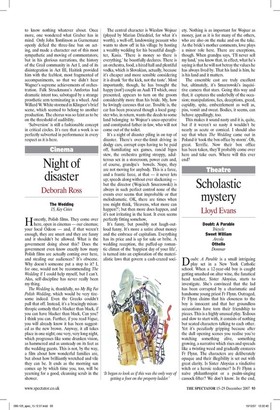Night of disaster
Deborah Ross The Wedding 15, Key Cities Honestly, Polish films. They come over here, open in cinemas — our cinemas; your local Odeon — and, if that weren't enough, they are smart and they are funny and it shouldn't be allowed. What is the government doing about this? Does the government even know exactly how many Polish films are actually coming over here, and stealing our audiences? It's obscene. Why doesn't someone put a stop to it? I, for one, would not be recommending The Wedding if I could help myself, but I can't. Alas, self-discipline has never really been my thing.
The Wedding is, thankfully, no My Big Fat Polish Wedding, which would be very tiresome indeed. Even the Greeks couldn't pull that off. Instead, it's a bracingly misanthropic comedy that's blacker than black, if you can have blacker than black, Can you? I think you can. Further, if you read Vogue, you will already know it has been suggested as the new brown. Anyway, it all takes place in one night; one very, very long night, which progresses like some drunken vision, as hammered and as unsteady on its feet as the wedding guests. This is not, by the way, a film about how wonderful families are, but about how brilliantly wretched and vile they can be. It ends as the morning sun comes up by which time you, too, will be yearning for a good, cleansing scrub in the shower.
The central character is Wieslaw Wojnar (played by Marian Dziedziel, for what it's worth), a well-off, landowning peasant who wants to show off in his village by hosting a wealthy wedding for his beautiful daughter, Kasia. 'There is money so there is everything,' he boastfully declares. There is an orchestra, food, a hired hall and plentiful vodka, which is Slovakian, actually, because it's cheaper and more sensible considering it is drunk 'for the kick, not the taste'. Most importantly, though, he has brought the happy (not!) couple an Audi TT which, once presented, appears to turn on the groom considerably more than his bride. My, how he lovingly caresses that car. Trouble is, the car has been procured though a local gangster who, in return, wants the deeds to some land belonging to Wojnar's unco-operative and constipated father-in-law, who will not come out of the toilet.
It's a night of disaster piling in on top of disaster. There's over-the-limit driving in dodgy cars, corrupt cops having to be paid off, humiliating sex games, rancid bigos stew, the orchestra getting stroppy, adulterous sex in a storeroom, power cuts and, of course, grandpa's bowels. Nope, they are not moving for anybody. This is a farce, and a frantic farce, at that — it never lets up; speeds along without ever slackening — but the director (Wojciech Smarzowski) is always in such perfect control none of the events ever seems that improbable or that melodramatic. OK, there are times when you might think, 'Heavens, what more can happen?'; but then more does happen, and it's not irritating in the least. It even seems perfectly fitting somehow, It's funny, but possibly not laugh-outloud funny. It's more a satire about money and the embrace of capitalism. Everything has its price and is up for sale or bribe. A wedding reception, the puffed-up romantic climax of the 'happiest day of your life', is turned into an exploration of the materialistic laws that govern a cash-crazed society. Nothing is as important for Wojnar as money, just as it is for many of the others, who are also on the make and on the take. As the bride's mother comments, love plays a minor role here. There are exceptions, though. When grandpa says, 'I'll never sell my land,' you know that, in effect, what he's saying is that he will not betray the values he has always lived by. That his land is him, he is his land and it matters.
The ensemble cast are truly excellent but, ultimately, it's Smarzowski's inquisitive camera that stars. Going this way and that, it captures the underbelly of the occasion; manipulations, lies, deceptions, greed, cupidity, spite, embezzlement as well as, piss, vomit and sweat. Bodies, it seems, can behave appallingly, too.
This makes it sound nasty and it is, quite, but if it weren't so nasty it wouldn't be nearly as acute or comical. I should also say that when The Wedding came out in Poland it 'took the box office by storm'. Oh, great. Terrific. Now their box office has been taken, they'll probably come over here and take ours. Where will this ever end?

































































































 Previous page
Previous page